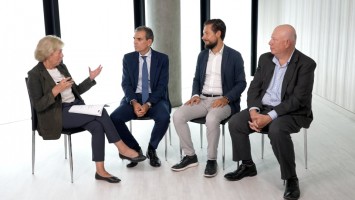SPRING 01 is the trial that I presented at the WIN Symposium this year and SPRING 01 is a phase I/II study enrolling patients with advanced metastatic non-small cell lung cancer. The trial itself has a fairly unique design. The background is that WIN has felt that, or hypothesised that, transcriptomics in addition to genomics will be very important in the future of precision oncology and so has built that in to this series of studies. Moreover, it has been felt that using a biopsy of normal analogous tissue to the site of the cancer, such as biopsying normal lung tissue for a lung cancer, and using transcriptomics on both the tumour as well as the normal tissue may be helpful to predict response to a triple therapy regimen.
So there’s an algorithm that has been previously published by WIN called the SIMS algorithm that is built into the trial. So what we do is we treat patients on a three drug therapy, in this case we’re using avelumab, axitinib and palbociclib. All patients received that treatment regardless of their genomic or transcriptomic signature and then retrospectively we will apply this SIMS algorithm to look and see if the SIMS algorithm predicted for responses.
Currently we have enrolled twelve patients on this study and what I can say is that the treatment appears to be well tolerated amongst those patients and we will be moving forward with expanding the phase I study, enrolling a few more patients to different dosing cohorts. Then once that’s completed and we’ve determined the recommended phase II dose we will move on to phase II. Now, the current study is allowing for prior therapy in non-small cell lung cancer; this next iteration when we move on to phase II will be enrolling probably in the first line so it will enrol first line metastatic non-small cell lung cancer patients. This is a platform, though, that could be extended to other disease areas in the future so we hope that as we are focussing most of our efforts in non-small cell lung cancer, because it is a worldwide unmet need, we expect that we will move forwards in other disease areas in the future with further collaboration through the WIN Consortium.
Is this something that has been studied before?
Other studies have been developed looking at transcriptomics or genomics. There was a prior study with WIN called WINTHER that has been published in Nature Medicine that looks at using genomics and transcriptomics to select therapy. However, in that trial genomics was used and transcriptomics were used more separately, in this trial we’re using them together in a combined algorithm. So that’s one of the novel approaches and overall the novel approach that WIN is taking is to use both tumour and analogous normal tissue and that is quite a unique approach.
How will this benefit patients?
What patients who have a cancer are most in need of is a faster moving, more nimble system of clinical trials that can bring drugs that are effective to them in a more efficient manner. On the one hand we can say that there has been an absolute explosion of knowledge in the way that we understand cancer in the last couple of decades and more recently expansion in the use of immunotherapy across the board on multiple different tumour types. But in an individual patient with cancer nothing is moving fast enough. One of the goals of WIN is not only to design innovative clinical trials that move the needle in precision oncology but to, hopefully, as we design those trials and conduct those trials we do so in a manner that brings about a faster windfall. That’s desperately needed from the patient perspective and I think that hopefully we’re well on our way.








